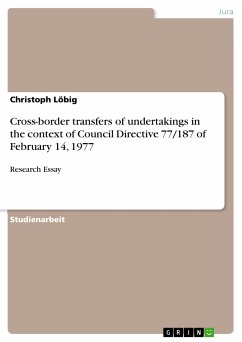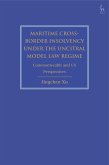Studienarbeit aus dem Jahr 2008 im Fachbereich Jura - Europarecht, Völkerrecht, Internationales Privatrecht, Note: 82,00 %, King`s College London (Faculty of Law), Veranstaltung: European Labour Law, Sprache: Deutsch, Abstract: While mergers, acquisitions and outsourcing processes were mainly confined to the borders of individual Member States between the late 1960s and mid-1970s, the internationalisation of capital markets, the abolition of obstacles to trade, the improved infrastructure and the widespread supply of qualified labour entailed a significant rise in the number of cross-border transfers of undertakings during the second half of the 1980s and from 1995 onwards. Between 2002 and 2006, offshoring and delocalization operations from one Member State to another increased by 800 percent according to the European Restructuring Monitor. The European Commission ascribes this trend to the enlargement of the European Union, the consolidation of the internal market and the introduction of facilitating legal measures and expects the increase of transnational transfers of undertakings to continue. The purpose of this essay is to investigate in how far the Directive could be amended to deal with the specific case of cross-border transfers of undertakings. In order to provide a sophisticated solution, I will first outline the relevant scenarios in which cross-border transfers of undertakings may possibly occur in practice and discuss whether those cases are covered or if the Directive's scope needs to be extended. Subsequently, I will check whether the definition of transfers of undertakings is broad enough to apply to cross-border transfers or if it is necessary to introduce amendments in order to safeguard workers' interests sufficiently. The main focus of this paper, however, lies on the analysis of the appropriateness of the three substantive pillars of protection in cross-border scenarios. Eventually, I will briefly address problems in relation to conflicts of jurisdictions before I give a personal recommendation.
Dieser Download kann aus rechtlichen Gründen nur mit Rechnungsadresse in A, B, BG, CY, CZ, D, DK, EW, E, FIN, F, GR, HR, H, IRL, I, LT, L, LR, M, NL, PL, P, R, S, SLO, SK ausgeliefert werden.









